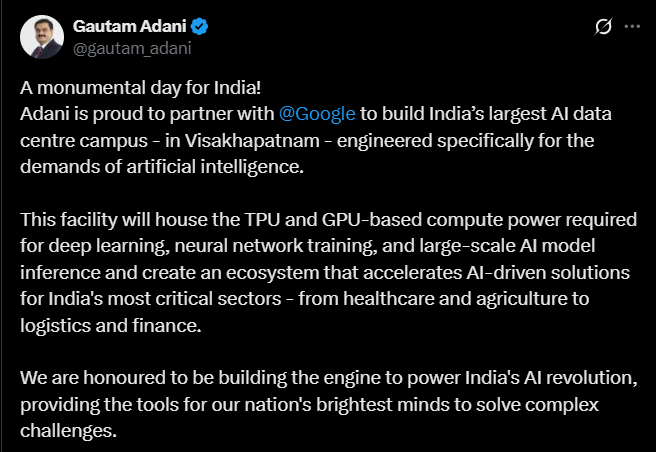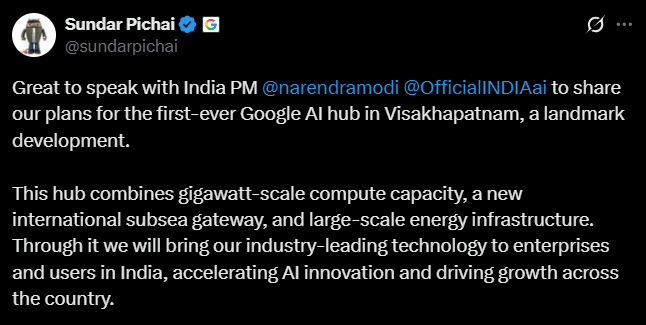Alphabet, the parent company of Google, has announced a $15 billion investment to establish its first Artificial Intelligence (AI) hub in India, located in Visakhapatnam, Andhra Pradesh. The facility will be the largest AI hub outside the United States, forming a critical part of Google’s global AI infrastructure network spanning 12 countries.
The announcement was made at Bharat AI Shakti, a Google-hosted event in New Delhi ahead of the India-AI Impact Summit 2026, attended by Electronics & IT Minister Ashwini Vaishnaw, Finance Minister Nirmala Sitharaman, and Andhra Pradesh Chief Minister N. Chandrababu Naidu, among others.
At the event, Thomas Kurian, CEO of Google Cloud, highlighted the strategic significance of the hub: “It’s the largest AI hub that we are going to be investing in anywhere in the world outside the US.” The project will be rolled out over the next five years (2026–2030) and represents a multi-faceted investment combining gigawatt-scale data centre operations, renewable energy infrastructure, and an expanded fibre-optic network.
Partnership with Adani Group for India’s Largest AI Data Centre
AdaniConneX, a joint venture of the Adani Group, will co-develop India’s largest AI data centre campus alongside Google. The hub will integrate large-scale energy sources, new transmission lines, and clean energy generation, ensuring a sustainable and resilient facility capable of powering the most demanding AI workloads in India.
Gautam Adani, Chairman of the Adani Group, described the partnership as “more than just an investment in infrastructure. It is an investment in the soul of a rising nation.” The hub is expected to create thousands of jobs in IT, cloud services, infrastructure management, and energy, boosting local employment and contributing to India’s economic growth.
"Adani is proud to partner with @Google to build India’s largest AI data centre campus - in Visakhapatnam - engineered specifically for the demands of artificial intelligence. This facility will house the TPU and GPU-based compute power required for deep learning, neural network training, and large-scale AI model inference and create an ecosystem that accelerates AI-driven solutions for India's most critical sectors - from healthcare and agriculture to logistics and finance. We are honoured to be building the engine to power India's AI revolution, providing the tools for our nation's brightest minds to solve complex challenges.", Gautam Adani, Chairman of the Adani Group mentioned on X.

The Visakhapatnam AI hub will include a 1-gigawatt data centre campus, built to the same high-performance standards that power Google services such as Search, YouTube, and Workspace. The facility will provide low-latency, high-reliability AI and cloud services for enterprises, developers, and startups across India.
Beyond computing capacity, the hub will feature a new international subsea gateway, bringing multiple international cables to India’s eastern coast. This will improve connectivity, resilience, and digital inclusivity, complementing existing landings in Mumbai and Chennai, and ensuring robust infrastructure for India’s digital economy.
"Great to speak with India PM @narendramodi @OfficialINDIAai to share our plans for the first-ever Google AI hub in Visakhapatnam, a landmark development. "This hub combines gigawatt-scale compute capacity, a new international subsea gateway, and large-scale energy infrastructure. Through it we will bring our industry-leading technology to enterprises and users in India, accelerating AI innovation and driving growth across the country," Google and Alhabet, CEO Sundar Pichai said in a post on X.
The investment aligns with the Indian government’s Viksit Bharat 2047 vision, enhancing the country’s position in global AI and cloud computing markets. A Google-commissioned analysis estimates that the AI hub will generate at least $15 billion in American GDP over five years due to new economic activity from cloud and AI adoption, while also leveraging American expertise in AI infrastructure development.
Finance Minister Nirmala Sitharaman praised the initiative as a reflection of India’s proactive policy framework since 2014, noting that Andhra Pradesh has emerged as an ideal location for high-tech investments. Chief Minister N Chandrababu Naidu also emphasized the state’s commitment to scaling up digital infrastructure to support AI innovation.
The hub will also promote sustainable energy usage, leveraging Google’s energy-efficient practices alongside innovative clean energy solutions in Andhra Pradesh. By combining innovation, sustainability, and connectivity, the project positions India as a strategic global hub for AI and a leader in advanced digital infrastructure.
State Technology Minister Nara Lokesh called the initiative “a massive leap for Andhra Pradesh’s digital future and global standing.” The hub aligns with the state’s target of developing 6GW of data centre capacity by 2029, positioning Andhra Pradesh as a prime destination for global tech investment.
Data centres house servers, storage systems, and networking equipment along with power and cooling systems necessary for data processing and storage. Over the past five years, India’s data centre capacity has grown rapidly, crossing 1GW in 2024 and nearly tripling since 2019, according to JLL’s India Data Centre Market Dynamics 2024 report.
The Andhra Pradesh government has offered subsidised land and electricity to attract international tech companies, benefits that Google’s hub will leverage. The facility is expected to support domestic AI development, enhance cloud services, reduce latency for local users, and strengthen India’s position in the global AI and cloud computing market.
The project will create employment opportunities in IT, cloud services, and infrastructure management, while also highlighting India’s growing role as a strategic hub for AI innovation. By choosing Visakhapatnam, Google underscores the importance of smaller towns in AI model training and data processing.
This landmark investment signals India’s rising significance in AI and cloud technologies, attracting global technology firms to contribute to the country’s digital ecosystem and innovation landscape.











.png)